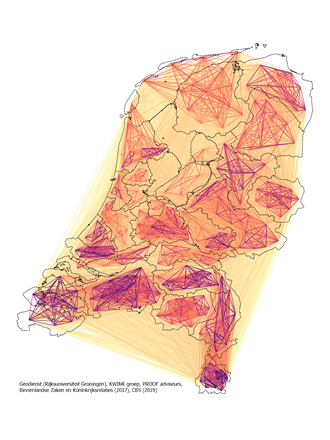UG/Campus Fryslân acquires € 400,000 for research into successful regional governance
A research programme being run by UG/Campus Fryslân on the added value of regional collaboration has received a huge boost in the form of a € 400,000 grant from the Ministry of the Interior and Kingdom Relations. The grant will enable researcher Prof. Caspar van den Berg and PhD student Sofie Dreef to analyse the workings of ‘Administrative Regional Ecosystems’ and put their findings to good use. In addition to the national-level research they are conducting, they will also make a thorough analysis of ten regions. Their recommendations are intended to help municipal and regional councils in the Netherlands to work more effectively and efficiently.
The allocation of the three-year grant from the Ministry will increase the body of knowledge about Dutch public governance at the regional level. UG/Campus Fryslân Prof. Caspar van den Berg is working closely with Frederik van Dalfsen from the management consultancy firm Berenschot, and Sofie Dreef, a PhD student from Campus Fryslân who is advising Berenschot and acting as the linchpin for the project.
Administrative Regional Ecosystems
‘At first sight, the Dutch political system seems clear and well-organized, but in reality, this is not the case’, says Sofie Dreef. ‘In practice, “managing the Netherlands” is a more complicated matter, with central government, provincial and municipal governments, as well as increasingly more regional governing partnerships.’
‘In recent years, collaboration on a regional level, i.e. the level between the regional and municipal levels, has started to play a more important role’, according to Van den Berg. ‘Take, for example, the ‘veiligheidsregio's’ (safety regions), the regional energy strategies, the environmental services and partnerships between municipalities in the social domain. This regional scale is actually very interesting. On a governmental level, the partnerships are not attached to any particular municipality, and the participants often vary according to the subject of the policy concerned.’
Van den Berg and Dreef are focusing on the ever-increasing number of administrative regional partnerships. They call the network of administrative partnerships in a region the Administrative Regional Ecosystem (BRE). The main research question is: Which factors make one BRE more successful than another when addressing societal challenges?

Participation in the research
In 2020 and 2021, a thorough analysis of ten regions will be made, before compiling the recommendations. There is still room for participants. Municipalities and partnerships that would like more information, or want to take part in the research, should contact Sofie Dreef , s.dreef rug.nl
More news
-
07 July 2025
The darker side of tourism
